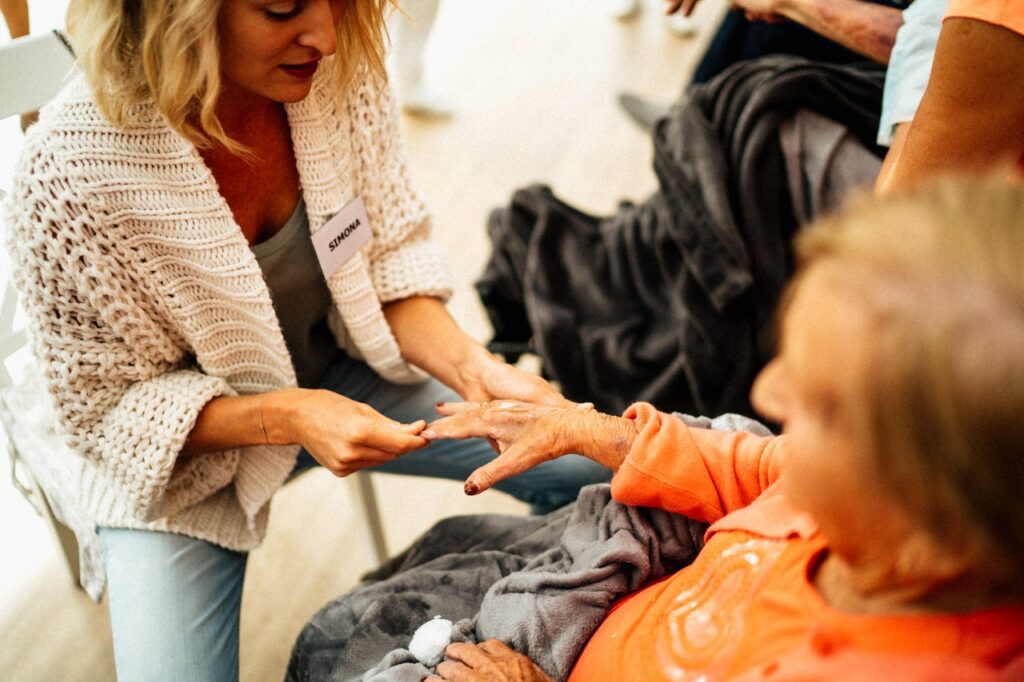
Committing a loved one to an assisted living facility, memory care facility, or some similar location is never easy. In fact, it’s one of the most difficult and overwhelming decisions that caregivers can make.
This is true regardless of whether it was an aging parent, a spouse, another relative, or someone else who made the move.
You’ve probably been through a long process as well.
Not only did you need to decide to move your loved one to a facility, but you’ve been researching the best facility for their needs, figuring out the finances, and talking to family members.
Perhaps your loved one was happy enough with the idea and worked with you or perhaps they resisted every step of the way.
Regardless, transitioning to the facility isn’t the end of your journey. Today, we’re looking at what you can expect in the coming days, weeks, and beyond.
What You Can Expect
You May Be Dealing With Intense Guilt
Guilt is perhaps the most common response to moving a loved one to a facility.
It’s easy to feel that you have abandoned your aging parent or perhaps shirked your responsibilities. Perhaps you think you should have been able to do better, should have been stronger.
You may have also promised to keep them at home with you no matter what.
Perhaps you’re dealing with family drama, where some family members are second guessing your decision or outright accusing you of abuse.
Any such issues are likely to make guilt even more intense.
Things To Think About
In most cases, any guilt you feel is misplaced.
Remember, you’re only human. Even if you made some mistakes and some bad decisions, you did the best you could for the time and the situation.
We also tend to hold ourselves and our lives up to far too high standards.
This isn’t a perfect world – and there often aren’t perfect solutions, particularly when it comes to aging.
Seriously. Government policies, social support, and agencies haven’t yet caught up to the needs of an aging population. While there are programs in place, there’s no comprehensive net of support and a ton of gaps.
And, guess what? The real world is messy. We often have the best intentions when we make our promises, but sometimes things go differently than we’d ever imagined.
Family caregivers do the best they can.
They often have no formal training and need to learn as they go. Getting everything right in this context is almost impossible.
Honestly, even if you made a poor decision, that doesn’t make you a bad person. No one makes the best decisions every time.
Besides, even if you feel guilty, moving your loved one to a care home may be the best choice for their health. After all, your ability to support them will be seriously limited if you’re overwhelmed and dealing with burnout.
Consider Therapy Or A Support Group
If you can’t shake guilt on your own, it’s important to reach out for extra support.
A therapist may be helpful here, particularly one who has worked with caregivers in the past. They should be able to help you reframe the situation and understand your own reactions better.
Support groups are powerful too, helping you to see that there are other people in a similar situation. Many will be going through the same emotional swings as you and group members can support and encourage one another.
There Are Emotional And Mental Health Challenges

Big transitions often come with strong emotional undercurrents, including unexpected ones.
We already talked about a sense of guilt, but that’s just one of the things you might feel. There will certainly be some relief in the mix and perhaps other emotional responses that are less expected, like anger or resentment.
Research also shows that while caregivers are resilient following the death of a loved one, they’re often much less resilient following a care home transition. This may be partly because there’s a sense of incomplete loss.
After all, your family member isn’t dead.
There’s still a relationship there and they need you in some ways (this is particularly true if the senior was your spouse rather than a parent). You can’t just ignore them for the rest of their lives. But, if they need to be in a care home, they’re not as ‘with it’ as they once were and the relationship has forever changed.
It’s easy to feel trapped somewhere in the middle, where moving on with your life doesn’t feel right (and may not even be possible), but you still need to step back from supporting your loved one.
It’s no surprise that so many difficult emotions come up.
This is another reason for considering therapy and support groups, particularly if you’re noticing any symptoms of depression.
Others May Be Second Guessing You
Caring for aging parents often leads to considerable drama, particularly among siblings. This is partly driven by differences in values and priorities, which leads to different opinions about what should be done.
Even if your siblings agree with you, there’s probably someone in the family who doesn’t. That’s the way of things.
Sometimes the criticism may be minor. Other times it might be much more severe, perhaps including the claim that you’re abandoning your parent.
What Can You Do?
You may be able to get family members on side by talking about the reasons behind your decision. Using a book like Difficult Conversations: How to Discuss What Matters Most as a guide can be helpful for untangling difficulties and moving forward.
There are also some interesting insights in a book called Making Tough Decisions About End-Of-Life Care in Dementia. While that book focuses on dementia patients and their families, some of the information is relevant to other situations too. I particularly like the information on dealing with different values and perspectives within a family.
That said, getting family on side won’t always be possible.
In those situations, it’s important to remember that you did the work. You planned, researched, and made the best decision you could for the situation. Someone else’s negative opinion doesn’t mean you were wrong. Not at all.
Remember too that you can’t control what another person thinks or how they respond. Sometimes it’s necessary to try and let it go, as best as you can.
Your Role Changes, Rather Than Stops
When you place someone in a care home, you’re no longer their primary caregiver. Staff are responsible for many of the duties that you once held.
Yet, many families find that they’re still actively involved in care.
What this looks like depends heavily on the type of facility your loved one is in, your concern about the care provided, and the care recipient themselves.
Some family members find that they’re checking in everyday or every other day, making sure that their loved one is supported. They may even be helping with some tasks, like medication management or advocating for the patient.
Such a situation can easily make caregivers more stressed and sometimes even increase their workload rather than decrease it.
Is The Facility Suitable?
This issue very much depends on the situation.
Sometimes you really do need to cover the gaps in what the home is providing. This is particularly true for assisted living. While assisted living provides a decent amount of support, most of the services are focused on personal care and health services.
Assisted living communities may not be enough for seniors with complex medical needs or those who resist the support.
Additionally, many facilities are understaffed, with staff members who are often stressed and overworked. They may be doing their absolute best for your loved one, but are stretched thin.
If your workload remains high while your loved one is in an assisted living facility, a nursing home, or a memory care facility – it might be a sign that the facility isn’t quite the right fit
Do You Need To Step Back?
Sometimes the issue isn’t related to the level of care at all. Heavily invested caregivers may find it difficult to step back and trust that someone else will take care of their loved one.
You may find that you’re involved in care more than you need to be.
You may resist the idea of stepping back, particularly if being a caregiver is a big part of your identity. However, burning yourself out isn’t doing anyone any favors.
The Senior May Struggle

Moving to a new home is often overwhelming.
Moving to a facility… well, that’s often worse.
This is partly because of what the transition represents. For many seniors, moving to a facility suggests a loss of independence. They may also feel that they are losing control over their lives. Some seniors will also actively resist the transition.
With all these challenges, it’s no surprise that seniors may struggle in the early days in their new home.
What happens next varies.
Many seniors do find their feet. Their new living environment can even offer a new lease on life, giving themselves the chance to enjoy activities and connection, without worrying about cleaning their home or keeping themselves safe.
Some seniors continue to struggle, perhaps even sinking into depression.
What You Can Do
It’s important to give the senior the time, and perhaps space, to adjust to their new living situation. After all, big changes take time to adjust to.
You can also help them engage more in their new community, such as encouraging them to join in on activities and helping them to connect with other residents. The facility may even allow you to participate in a few activities with the senior.
Being engaged and connected with the new living environment eases the transition. This can also help seniors to realize that the facility can be as good or even better than their previous home, if they allow it to be.
Still… it’s also worth keeping an eye out for signs of deteriorating mood, particularly signs of depression. Such symptoms may necessitate a doctor’s visit to determine the next best steps.
There May Be Abuse
Assisted living facilities, nursing homes, and memory care facilities are all meant to support your loved one and keep them safe. They often do this exceptionally well, as staff are trained, compassionate, and well-resourced.
But…
This isn’t a guarantee.
Senior abuse can occur in such facilities. Sometimes this is the result of active intentional abuse, while other times it is negligence instead, perhaps due to overworked staff.
What’s more, abuse in care homes is shockingly common. Some statistics suggest that as many as 1 in 3 seniors have been victimized in nursing homes. And, there are likely still many cases of abuse that were never reported and don’t make their way into official statistics.
Because of this, it’s important to keep an eye out for signs of a problem. Some issues include the following:
- Unexpected bruising, particularly on the face or torso. Accidental bruising on limbs or extremities can easily occur, especially when seniors are taking blood thinners, but accidental torso or facial bruising is much rarer.
- Strong or sudden behavioral changes, particularly anxiety, restlessness, or depressive symptoms.
- Rope marks or any other signs of restraint.
- Injuries, including sprains or broken bones, especially if no fall has been reported.
- Significant dehydration.
- Large bed sores or dramatic rashes. Good practices should keep bed sores and rashes to a minimum.
It’s important to report abuse to the correct authorities. This will often be the local Adult Protective Services for your state or perhaps local law enforcement. Doing so helps ensure that the issue gets addressed and protects other seniors from abuse.
Things Often Get Easier With Time
Moving a loved one to a facility is a big decision that changes many aspects of their life and yours. It’s not surprising that the process comes with plenty of emotional and practical aspects.
Thankfully, many of these challenges relate to the transition itself. They tend to settle down over time, as you and your family get used to the new situation.
This isn’t a guarantee, of course, but it’s something to put your hope in.
If you find yourself struggling, check out some of the approaches in the next section. These can help you to find your feet.
What You Can Do
While things will often naturally get easier as you go, there are also steps you can take to make things better.
Broaden Your Identity and Get Back Into Life
Caregiving often narrows your world. It can easily get to the point where being a caregiver seems like the bulk of who you are.
Even if this is only partly the case, it’s often enough to make the transition to a care home very difficult for you. It may even feel like you’ve lost a huge part of your identity.
Some caregivers try to compensate by supporting their loved one as much as possible within the care home. But, this often isn’t the best answer.
Instead, this is the time to work on you. This is your chance to broaden your identity beyond being just that of a caregiver.
So, what are the things that matter to you? What excites you? Where can you start to find social connection again?
If you’ve been a caregiver for a while, you might not have any easy answers to these questions. You may find that you need to experiment instead. That’s okay. Think of this as a new stage of your life – a chance to rediscover yourself.
Crucially, it’s worth doing this even if you feel guilty.
Guilt is often a misplaced emotion. It will pass in time (perhaps with therapy), but until it does pass, it shouldn’t be the driving force beyond your decisions.
Find Support
There are two important kinds of support during this transition.
The first is finding people to support you in the challenges you’re facing directly. This could include therapy, a support group, or simply a good friend who really ‘gets it’.
Therapy could be particularly important if you’re feeling emotionally overwhelmed or start to notice the symptoms of depression. Seriously.
But, you also need broader social support.
You need people who will connect you back to life. People who can help you enjoy yourself and find your feet again. This is crucial. These connections will help you make the transition out of being a caregiver and help you find yourself again.
Be Kind To Yourself
Finally, remember to be gentle and kind to yourself, particularly in the early days. The practice of self-compassion is relevant there, as this is a way of recognizing the distress that you’re in without judgment.
Think of a good friend going through this situation.
What kind words would you say to them? How would you support them? Then, turn these practices on yourself.
Seriously. Give yourself a break. Many of us are far too harsh on ourselves.
Final Thoughts
Finding your feet when a loved one moves to a facility can seem overwhelming at first. You may be hit by many emotions all at once or find yourself going numb instead.
There are also few systems in place to help the caregiver work through this transition, so it’s hard to know what to do or whether your situation is normal. Sometimes you have no idea what to expect at all.
But, you’ve got this.
Remember that moving your loved one to a facility doesn’t make you a bad son, daughter, husband, wife, or friend. Doing so is often the best way to support them and to protect your own well-being (which is incredibly important too!).
Advance Planning Coaching
It’s never too early to think about the future. Kapok’s Advance Planning service can help you understand the process of advance care planning, including the paperwork involved and important areas to think about.

Leave a Reply